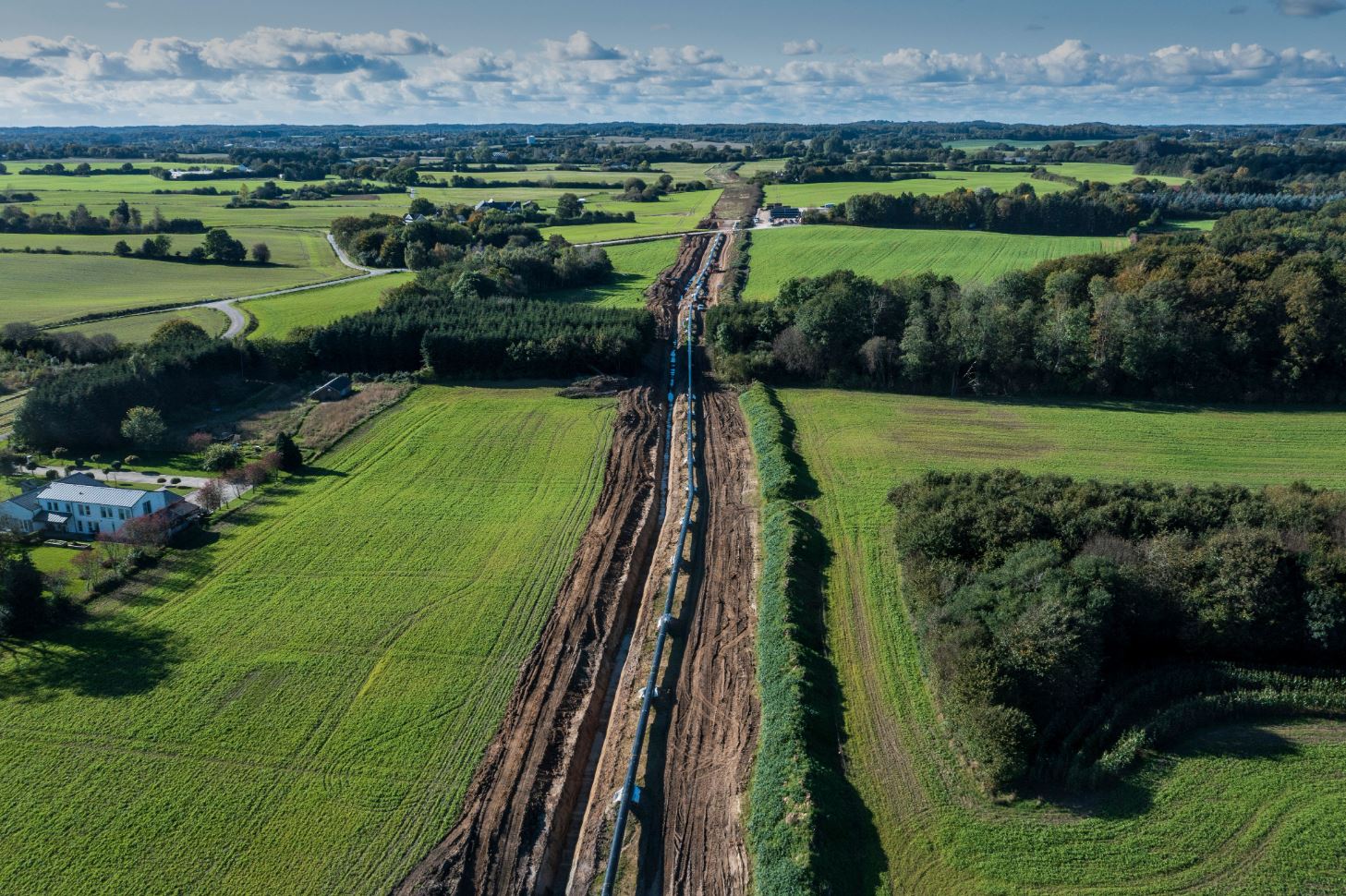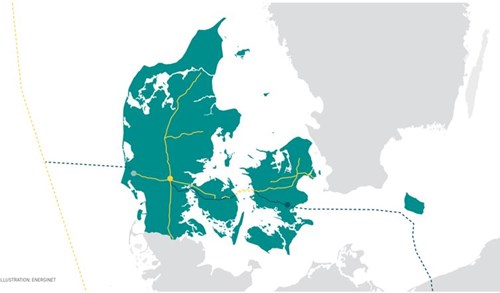
Russia's war in Ukraine put pressure on Baltic Pipe, which ends up costing approx. DKK 10 billion
After the invasion of Ukraine, the Baltic Pipe gas project suddenly became much more crucial to the energy supply of Poland and Eastern Europe. Time pressure, energy crisis and subsequent price increases made the project more expensive. Baltic Pipe was already under severe pressure due to heavy rain, the corona pandemic and an environmental permit that was suddenly withdrawn. The exact bill cannot yet be calculated, but will be approximately DKK 10 billion - more than the DKK 8.2 billion (DKK 9 billion in 2023 prices), which was expected in the latest announcement from 2021. The project will be paid by those using the gas system. Baltic Pipe will still be a billion-kroner profit for Denmark.
In its first year – after its opening on 30 November 2022 – the Baltic Pipe gas pipeline has transported 6.3 billion cubic metres of gas from Norway to Poland. During several periods, the gas pipeline has been exploited to its maximum and has proven to be even more relevant and timely for Europe's gas supply, than originally assumed.
Danish and Swedish consumers have also been supplied with gas through the pipeline. A total of 6.9 billion cubic metres of gas from Norway entered the Baltic Pipe connection in its first year.
But even though the gas is flowing, work is still being done on parts of the project – especially on the new compressor station in Everdrup in South Zealand. The compressor station, which pressurizes the gas so that it can be transported across the Baltic Sea to Poland, is in operation, but several parts of the plant still need to be completed. In order to meet the fixed deadline for the project, the construction work was rescheduled to be carried out in stages.
War and energy crisis
The Baltic Pipe project is not expected to be fully completed until 2024. Thus, it is not possible to calculate the final, exact total cost. But it is already clear that the Danish part of the project will cost approx. DKK 10 billion, which is more than the DKK 8.2 billion (DKK 9 billion in 2023 prices) that was expected in the latest announcement from 2021.
"After Russia invaded Ukraine and most of the Russian gas was shut off, there was an acute energy crisis in Europe. It became imperative for Energinet to get Baltic Pipe up and running as quickly as possible and in time before winter 2022, so that Poles and citizens in other Eastern European countries, including Ukraine, could be supplied with enough gas for heat and power," says Torben Brabo, Energinet’s Director of International Relations.
Already under great pressure
He points out that the construction work had already been greatly delayed and became more expensive when, suddenly and in the middle of excavation work across Denmark, the project lost its environmental permit. For two long sections, totaling 80 km, it took ten months before a new environmental permit was in place and excavation work could resume. This involuntary break from work and renegotiation of contracts with the contractors resulted in a huge increase in costs – up to DKK 1 billion.
An additional bill to neighbours
The bill for the Baltic Pipe project is paid by the gas companies transporting the gas through the pipeline. As the pipeline transports large quantities of Norwegian gas through Denmark to Poland, it will therefore also be market participants using the pipeline who pay a large part of the bill for Baltic Pipe. Poland receives what corresponds to 4-5 times the total Danish gas consumption through the new pipeline.
"Of course, we are sorry that we will be passing an additional bill to users, also in neighbouring countries, but conversely – to ensure Polish and Eastern European security of supply, it became extremely important that Baltic Pipe was completed and commissioned. We actually managed to get Baltic Pipe fully operational one month before the revised plan," says Torben Brabo.
Still a major gain
Because Baltic Pipe entails significantly more gas transport in the Danish gas system at a time when general gas consumption in Denmark is declining, the pipeline helps to keep tariff costs down for individual Danish gas consumers. There are more consumers to cover the total costs of operating the gas system, and therefore the individual consumption tariff payment will be lower than it would have been without Baltic Pipe.
Baltic Pipe is still worth DKK billions for Denmark and the users of the pipeline.
Mice and other major unforeseen problems
The Baltic Pipe project was decided in November 2018. From the beginning, it was subject to a tight schedule, as Poland would not have Russian gas supply from 2023.
In addition to the Danish Environmental and Food Appeals Board overruling the project’s environmental permit, while it was further clarified how the so-called Annex IV animal species, such as dormice, birch mice and bats and their breeding and resting areas, were protected during work on the 210 km long gas pipeline, the project was also challenged by other factors. First by a spring season with extreme amounts of rain, making it difficult to work in the fields, and then by the corona pandemic, where 1000 workers had to work divided into small teams with requirements for distance, protective equipment, etc.
Seller's market
Problems also arose in getting the two large technical onshore facilities – the receiving terminal on the Danish west coast and the compressor station in Everdrup – completed on time.
"As we have put pressure on the suppliers to finish Baltic Pipe to ensure gas supply in Europe, we have not had the best opportunity to negotiate. It is expensive to be under pressure and to force completion," says Torben Brabo, pointing out that at the same time, prices for a number of goods and services for Baltic Pipe rose as the energy crisis, due to the Russian war, drove up inflation and prices globally.
There have also been challenges in getting some suppliers to live up to the agreements made. In some cases, Energinet decided to take responsibility for completing tasks to ensure standard and functionality.



